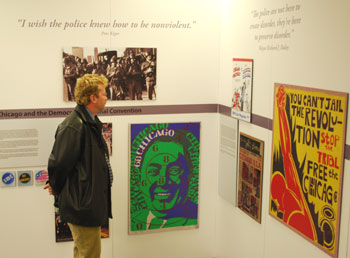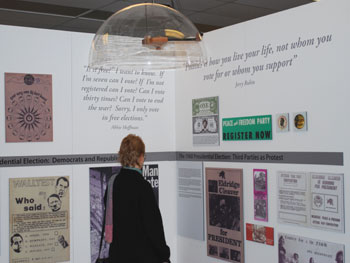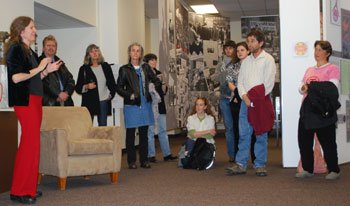Echos of 1968 Now and Again

Labadie Collection curator Julie Herrada's favorite piece in the exhibit is the poster hanging on the right: "You can't jail the revolution. Stop the trial. Free the Chicago 8."
As the tall, wiry gentleman, who’d been younger back in 1968, finished off an impromptu vocal performance – “There ain’t no time to wonder why, Whoopee! we’re all gonna die!” – a couple dozen people standing in a semicircle applauded the effort. Chuck Ream doesn’t randomly show up to the Gallery (Room 100) in the UM Hatcher Graduate Library to entertain folks with Country Joe McDonald protest songs from the ’60s – the occasion was an informal tour of a show organized by Julie Herrada, curator of the Labadie Collection at the UM library. The show, which is on display through Dec. 19, is titled “The Whole World Was Watching: Protest and Revolution in 1968, Selections from the Labadie Collection.”
The selections, explained Herrada, are reproductions as opposed to the actual items in the collection. Because the Gallery is so easily accessible to the public – off the Diag, straight through the Hatcher Graduate Library doors, to the back on the left – the items for the show were scanned, then printed out in-house, then sent to Foto 1 for mounting on Gatorboard®. Some of the items measure at least 4 feet along one side, but Herrada said that the library’s scanners can handle those dimensions in a single scanning pass – no digital stitching together of image files required.
The exhibit is organized thematically, not chronologically. So there are sections devoted to protest groups, the elections, the Democratic convention, and the international scene. Herrada said that it was difficult to select the items – she had over 500 items scanned for consideration. The somewhat arbitrary delineation of 1968, which makes sense now in 2008 as the 40th anniversary of that year, actually made the selection task somewhat easier, said Herrada. Her favorite piece? A silk-screened poster featuring a red figure, fist aloft with text reading, “You can’t jail the revolution. Stop the trial. Free the Chicago 8.”
An audio component to the show is made possible by a loan from the North Campus media lab of some plastic domed units hanging from the ceiling. When viewers of the exhibit stand directly under the units they can hear a looped soundtrack of 200 songs, which provides a musical backdrop. The 200 tracks were put together by Will Lovick, possibly familiar to Chronicle readers from Wazoo Records.
On the evening Herrada gave the informal tour of the exhibit, the assembled visitors needed little prodding to share their memories of 1968, although no one worried too much about reminiscences that slipped into 1969. One visitor told of growing up in Decatur, Illinois, with a father who subscribed to the Village Voice and decided that Greenwich Village would be a great place to take the family on summer vacation. When they arrived the place was deserted … everyone was at Woodstock.
Herrada’s sisters, Mary and Elena, were on hand for the tour as well, and related to the group their positive experiences with the Black Panthers growing up in Detroit. There’s currently no physical guest book at the exhibit, but there’s an online guestbook where visitors can share their memories of 1968. Chronicle comments are closed for this article as an encouragement to readers who have memories to share to visit that guestbook.
Readers who are sorry they missed Chuck Ream’s rendition of Country Joe’s song, but who would like to hear Country Joe himself sing, should mark their calendars for Nov. 13 at 8 p.m. That concert takes place at the same venue as the exhibit: Hatcher Graduate Library in the Gallery. It’s free to the public, and first come first served. That concert will be preceded by a panel discussion at 4 p.m. moderated by Paul Courant, UM’s dean of libraries. It was Courant’s idea to open up the space of the Gallery to the public – it was previously filled with staff cubicles.
Herrada provided some of the panelists’ names during the tour – they’re huge names coming from far away – but others are still being invited. So Chronicle readers might want to monitor the UM library’s website for the formal announcement of the complete panel.
Note: Chronicle readers might recognize the name Chuck Ream as a proponent of Proposal 1 on the ballot this November, which would legalize medical marijuana. In circulating pamphlets to the tour attendees, we believe he might have been preaching to the choir.





